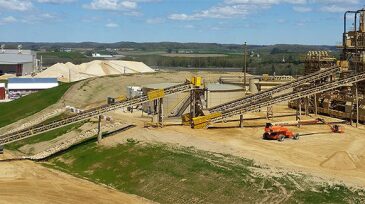Completions
Intelligent completions could improve many of the world’s oil and gas wells, but not all are suited to the technology. There is another option.
Casing deformation has emerged as a major challenge in China’s unconventional oil and gas fields, prompting the development of new solutions to address the issue.
The US supermajor is using one of its lowest-value hydrocarbon products to generate double-digit production increases in its most prolific US asset.
-
A Canadian startup company is developing a tool that uses solid rocket fuel to fracture vertical and horizontal wells without the use of water.
-
To reduce the risk of wells getting “frac hits,” Permian Basin operators around Midland created an information exchange to give them notice of nearby fracturing.
-
On September 13, the Delaware River Basin Commission voted to begin the process to ban hydraulic fracturing near the river to protect the drinking water of 15 million people.
-
The boom in organic shale plays has revealed the critical need to size hydraulic-facture treatments correctly to achieve commercial success.
-
A Gulf of Mexico case history is presented describing the successful delivery of two deep high-pressure high-rate-designed oil wells in an ultradeepwater environment.
-
A new line of specialized polycrystalline-diamond-compact bits have been tested in a series of Bakken wells. The bits’ integrated design allowed significant increases in drilling rate and the number of plugs drilled.
-
Predictive models may help in the estimation of produced water volumes and the optimization of the locations for water recycling and disposal facilities to reduce truck hauling distances.
-
Driven by a recovery in well completions and increased proppant loading per well, the market for raw fracturing sand is expected to grow by more than 4% annually through 2021, an industry research study says.
-
Senior Research Scientist and SPE Distinguished Lecturer Ian Walton uses a semianalytic shale gas production model to show that natural fractures, contrary to the intuitive beliefs of many, do not contribute significantly to production.
-
Service company executives examine how the oil price downturn affected supply and demand for their services in the unconventional sector, and strategies they have undertaken to stay afloat as operators adjust to uncertainty.

![JPT_2025-09_GuestEd1_SS_382853197[4].jpg](https://assets.spe.org/dims4/default/d929328/2147483647/strip/true/crop/850x566+0+1/resize/850x566!/quality/90/?url=http%3A%2F%2Fspe-brightspot.s3.us-east-2.amazonaws.com%2F8a%2F95%2Fe4e82cb54fd597d497a5b1267f8a%2Fjpt-2025-09-guested1-ss-3828531974.jpg)











